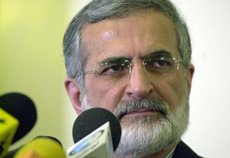The International Atomic Energy Agency (IAEA), the United Nations subgroup overseeing nuclear activities, is working with diplomats from Great Britain, France, Germany, and Iran to continue drafting a resolution to monitor Iran’s nuclear activity and effectively freeze it. Concerns surfaced following a Nov. 18 contact from the National Council of Resistance of Iran, a dissident group on the U.S. State Department’s list of terrorist organizations. The communication informed BBC News of a “secret uranium enrichment site built north of Tehran.”
Houssein Moussavian, a top Iranian negotiator, responded to these claims by saying the accusations of hidden nuclear plants were not true.
The IAEA received a letter Nov. 28 from Iranian officials expressing their willingness to cooperate in a nuclear freeze.
The letter must be reviewed closely to determine the exact intentions of Iran, members of the IAEA said. All nuclear enrichment in Iran must be suspended for the resolution to go into full effect.
Moussavian told BBC News that the suspension is not permanent or legally-binding, but a step taken by Iran to build trust around the world. Iran is home to huge amounts of naturally occurring uranium, and asserts its legal right to create its own source of nuclear energy.
Iranian Foreign Minister Karmal Kharrazi told CNN.com, “There has been a good deal of changes in the draft resolution, but still, there are points that are not acceptable to the Islamic Republic of Iran.”
The Iranian government asked for 24 centrifuges to be kept out of the resolution. These centrifuges are used to purify uranium hexafloride, which is then used to fuel power plants. The same technology can be used to create nuclear weapons.
BBC News reports that Abdul Qadeen Khan, a nuclear genius from Pakistan, publicly admitted to illegally transporting nuclear secrets to Iran. Khan has also taken responsibility for selling secrets to Libya and North Korea.
Diplomats told CNN.com Nov. 26 that Iran agreed to include the 24 requested centrifuges in the freeze once two clauses were erased from the resolution. One of the clauses included automatic referral to the United Nations Security Council by the IAEA at the first sight of suspicion as well as unlimited access for the IAEA inspections services. In return, the IAEA agreed to monitor the centrifuges with cameras rather than following the previous plan of closing them with steel wires.
The U.S., which has publicly stated that it prefers stricter language and rules in the resolution, requested this language that was dropped. The U.S. does not communicate with the Islamic Republic of Iran, which is included in President Bush’s “axis of evil.”
A non-U.S. member of the IAEA told BBC News that Iran exploited the time between the announcement of the freeze and its enactment to produce massive amounts of uranium hexafloride in Isfahan, a district of Tehran. The Isfahan plant can enrich more than 300 tons of uranium a year. This information is partially what led to discussions on a freeze.
“The allegation is timed to coincide with the next meeting of the board of governors of IAEA. And every time just before the meeting there are these kinds of allegations either from the U.S. or terrorist groups. And every time these allegations have proven to be false,” Moussavian said.
Richard Boucher, U.S. Deputy Secretary of State, said that Iran’s actions were “characterized by concealment, misleading information and delays…” which “resulted in many breaches by Iran of its obligations” during the past two decades.”
“We’ve noted that cooperation has improved appreciably in all of these areas,” he said.

